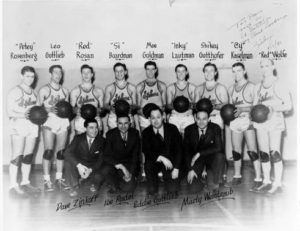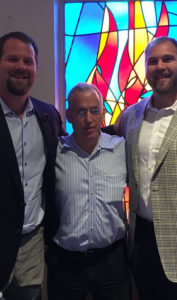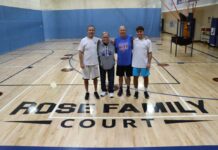There is only one Jewish player in the National Basketball Association today, Washington Wizards forward Deni Avdija. But if it wasn’t for his Jewish predecessors in professional basketball, the Israeli and his non-Jewish contemporaries might not even have a league.
In the 1920s, ’30s and early ’40s — the decades predating the launch of the NBA — Jewish players abounded in leagues like the American Basketball League, helping to establish pro basketball in America.
One all-Jewish team, though, still stands as the pinnacle of Jewish success on the hardwood. The Philadelphia SPHAs, who grew from the city’s Jewish neighborhoods to the pro circuit, won seven championships in 11 years in the ABL and Eastern Basketball League. The team was named after the South Philadelphia Hebrew Association, an early sponsor.

Now, the team that history keeps forgetting is cemented in it…at least in Jewish circles.
On May 1 at Temple Israel in Lawrence, New York, the Philadelphia team and its Jewish coach/owner, Eddie Gottlieb, one of the fathers of the NBA, too, were inducted into the Jewish Sports Heritage Association’s Hall of Fame.
The Jewish Sports Heritage Association is a national nonprofit that educates Jews about their own history in sport. Director Alan Freedman visits synagogues and Jewish community centers, among other locations, to talk about Jewish sports legends and teams to religious school students, men’s club members and other groups.
Freedman has a memorabilia collection, too, and while his hall of fame does not have an official location, it is official. Sportswriters vote on the inductees, and family members of honorees attend the annual ceremony.
Gottlieb and the SPHAs joined other Jewish luminaries, like former New England Patriots receiver Julian Edelman, in this year’s class.
“These guys had love of the game,” Freedman said of the SPHAs. “They weren’t doing it for any great amount of money.”
That statement was especially true of Gottlieb, who served as the team’s coach, manager and promoter, according to author Douglas Stark, who wrote “The SPHAS,” a book about the team. Gottlieb’s nickname was “the mogul” long before Jay-Z made the concept cool, and he is known as one of the key figures behind the early NBA, even writing the league’s schedules by hand.
But decades before the NBA even started, Gottlieb was driving his SPHAs around the Midwest to play games. Players would ask the mogul why they were doing that, Stark said.
He would answer that they were trying to grow professional basketball.
“He understood the sport’s potential as a business and as entertainment,” Stark added.
Later, before Red Auerbach and Bill Russell brought the fast break to the NBA with the Boston Celtics, Gottlieb pioneered it with his Jewish players.
“They would run,” the author said.
The SPHAs would get a rebound and pass the ball up court before the opponent could get back. They would often score without the ball touching the court.
Moe Goldman was the athletic center that started the break. Red Wolfe and Louis “Inky” Lautman would help Goldman control the paint. Shikey Gotthofer, Gil Fitch and Harry Litwack (the future Temple University coach) would handle the ball and score. And Cy Kaselman and Red Rosan used their old-school two-handed set shots to keep opponents honest from the outside.
“They were very talented,” Stark said.
But as talented and successful as they were, the SPHAs did not reap the kinds of benefits you would expect for professional athletes.

Jay Rosan, a Philadelphia resident and Red Rosan’s son, said his father made $25 or $50 a game. He was a tile contractor when he wasn’t playing.
Later, Jay wanted to put up a basketball net at their house, and his father wouldn’t let him. He felt that basketball didn’t leave him with much; so he didn’t want his son to fall in love with it.
“He wanted me to have a profession,” Jay Rosan said.
The SPHAs are not mentioned among the great teams in basketball history, but history hasn’t forgotten them: They have a photo exhibit in the Naismith Memorial Basketball Hall of Fame in Springfield, Massachusetts, and are the subject of Stark’s book. But it has not fully appreciated them, either.
That’s why both Rosan and Stephen Goldman, Moe Goldman’s son, attended this latest hall of fame ceremony via Zoom. Both sons feel it’s important to help the SPHAs live on.
“Most people aren’t aware of it, and I think it’s important to keep alive,” Goldman said. “When my friends say ‘What did your dad do? And I say, ‘He was this great professional basketball player,’ at first they think I’m kidding.” JE






